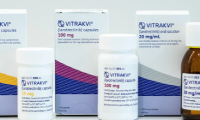-
prioritizing efficacy when considering quality of life
- Source: drugdu
- 226
- March 30, 2023
-
Roche Holding AG Receives FDA Approval for New Cancer Treatment
- Source: drugdu
- 140
- March 24, 2023
-
All hormonal contraceptives ‘carry small increased risk of breast cancer’
- Source: drugdu
- 118
- March 22, 2023
-
Pfizer and Astellas’ Xtandi shows promise in phase 3 prostate cancer study
- Source: drugdu
- 146
- March 21, 2023
-
New Drug Combination Shows Promise in Treating Lung Cancer
- Source: drugdu
- 121
- March 21, 2023
-
New Study Shows Promising Results for Targeted Cancer Therapy
- Source: drugdu
- 171
- March 20, 2023
-
New Study Shows Potential for Personalized Treatment for Lung Cancer
- Source: drugdu
- 158
- March 20, 2023
-
Scientists identify link between genetic changes and rare childhood cancer rhabdomyosarcoma
- Source: drugdu
- 167
- June 28, 2021
-
Alchemab to collaborate with AstraZeneca on prostate cancer research
- Source: drugdu
- 369
- May 7, 2021
-
Gilead’s Trodelvy scores accelerated approval in advanced bladder cancer
- Source: drugdu
- 174
- April 15, 2021
your submission has already been received.
OK
Subscribe
Please enter a valid Email address!
Submit
The most relevant industry news & insight will be sent to you every two weeks.













